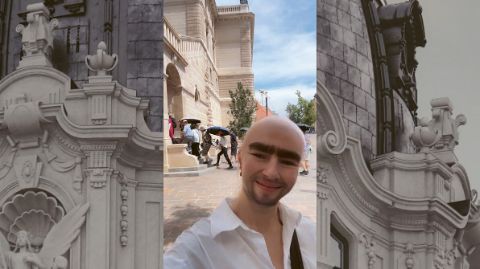Mona Vătămanu & Florin Tudor

Mona Vătămanu and Florin Tudor in collaboration with Ilinca Manolache, still from Ornament is Crime (2025). Courtesy of the artists
Mona Vătămanu & Florin Tudor, who have been collaborating since 2000, are incisive chroniclers of the post-Ceaușescu sociopolitical landscape of Romania and the broader post-communist realms. Their work, in media as diverse as film, performance, and oil painting, traces how historical legacies reverberate in the present. Another form they have made use of is the textile banner, with previous iterations proclaiming twists on political slogans (‘Long Live and Thrive Capitalism!’, a riff on the ubiquitous ‘Long Live and Thrive Socialism!’ of times gone by), playing with the hollowed out meaning of language in repressive regimes. Yet in our current post-truth universe, the corruption of language and its ability to deliver anything but platitudes can seem like the only common ground. Their newly commissioned work bears a different kind of slogan: ‘We Hope This Message Finds You Well!’ This banal, throw away line—a classic opener of the work email—might rightly induce anxiety. In a world where it feels like everything is falling apart, being ‘found well’ may sound as oxymoronic as the phrase ‘Long Live Socialism!’. The political valence of this meaning might be found in the unavoidable dissonance that every viewer will feel: We are not okay, not collectively or individually, and yet spaces to commiserate, much less mobilize, are shrinking by the minute.
Another one of their long-standing interests is the haunting presence and ideological resonance of architecture constructed by political regimes. In their recent film Ornament is Crime (2025), they bring Bobitza—a satiric alter ego avatar from the nowadays globalized manosphere—to Budapest. Bobitza, a character Romanian actress Ilinca Manolache has been developing since 2020 on Instagram and TikTok, spouts a running commentary of Andrew-Tate-style machismo, nationalist grandiosity, sexual innuendo, and plenty of profanity. In the film, Bobitza visits Viktor Orbán’s restorationist renovation of the Habsburg-era Buda Castle and other sites beloved of Hungarian nationalists. The obsession with ornament and the yearning for the trappings of empire, past and future, are called out with reference to Austrian architect Adolf Loos’s 1910 lecture on ornament (tweaked in the film’s title), as Bobitza considers the appalling economic cost of such charismatic frippery. But that’s not all: Bobitza’s wild metanarrative draws parallels as wide-ranging as the historical continuity between Second World War Romanian fascism, the Ceaușescu regime, MAGA, and Elon Musk’s fantasy of travel to Mars. This far-flung tapestry is further peppered with serious reference to philosopher Georges Bataille’s writings on architecture and terror and Walter Benjamin’s concept of history as a whirlpool. Bobitza’s thoughts vertiginously return to Bucharest, as she muses if the mystical powers of ChatGPT might be able to erase the proximity between Ceaușescu’s Palace of the Parliament and the newly constructed Orthodox People’s Salvation Cathedral. The madness continues.
Commissioned by Haus der Kulturen der Welt (HKW), produced by Mona Vătămanu and Florin Tudor in collaboration with Ilinca Manolache / Dinu Bodiciu, 2025
Works in the exhibition: Mona Vătămanu and Florin Tudor in collaboration with Ilinca Manolache, Ornament is Crime (2025), 1-channel video, colour, sound, 12' 14"; Mona Vătămanu and Florin Tudor in collaboration with Dinu Bodiciu, We hope this message finds you well! (2025), textile banner. Courtesy of the artists